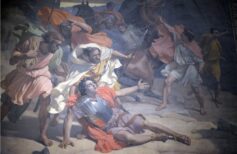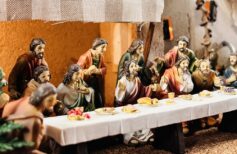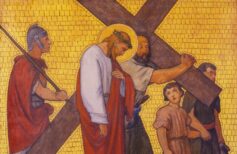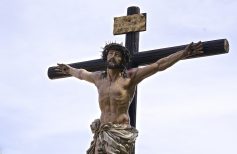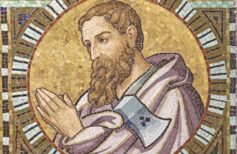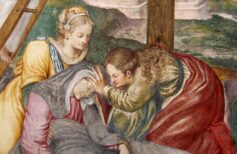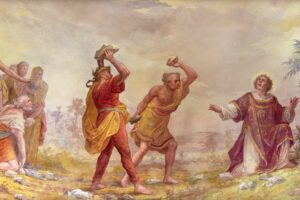Who was Saint Disma, the repentant thief crucified alongside Jesus on Golgotha? Let’s find out his story and how he became a saint
Contents
From the Gospels we know that Jesus was not led to Calvary to be crucified alone. “Two evildoers were also led with him to be executed. When they came to the place called the Skull, there they crucified him and the two evildoers, one on the right and the other on the left.” (Luke 23:32-33). John the Evangelist does not dwell on these figures at all. In the Gospels of Matthew and Mark we read that both thieves reviled Jesus, while in Luke’s Gospel we notice a significant difference: the thief on the right, known in apocryphal texts as Gestas, bitterly insulted Jesus, but the other, Disma, allegedly defended him and commended himself to him: “One of the evildoers hanging on the cross insulted him, “Are you not the Christ? Save yourself and us too!” But the other rebuked him, “Do you not also fear God and are damned to the same penalty? We justly, because we receive righteousness for our deeds, he, on the other hand, has done nothing wrong.” And he added, ‘Jesus, remember me when you enter your kingdom'” (Luke 23:39-42). Today we are talking precisely about St. Disma, or Dismas, the Good Thief, one of the thieves crucified with Jesus, also known as Titus in some apocryphal texts, such as the Arabic Gospel for Children, and as `by the Russian Orthodox Church.
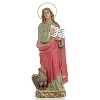
What makes this character, who appears in only a few lines of a single canonical Gospel, so special? Well, St. Dismaswas the only saint to be made such directly by Jesus! In fact, to his heartfelt plea Christ “answered him, ‘Truly I tell you, today you will be with me in paradise'” (Luke 23:43).
Who were the two thieves on the cross with Jesus?
We do not know much about the two thieves crucified on Calvary with Jesus. According to certain traditions they were two of the bandits who attacked Mary and Joseph during the Flight into Egypt to rob them. We know that death by crucifixion was intended for low-level criminals and slaves who fled from their masters, because they were believed to deserve such a horrible death more than others and served as a warning to their peers. In the Gospels they are referred to by the Greek word kakourgoi, meaning men who were guilty of aberrant crimes.

Fleeing to Egypt: the journey of the Holy Family to escape King Herod
The fleeing to Egypt is an episode from Jesus’ childhood. Between history and faith here is the Savior’s first journey
The Gospel of Nicodemus or Narrative of Joseph of Arimathea contains references to the reasons for condemnation. Gestas was a marauder and murderer, who slaughtered wayfarers, tortured women by cutting off their breasts, drank the blood of children, and took pleasure in the evil he did, without respect for men or God. In the same apocryphal Gospel Disma, or Dema, came from Galilee and owned an inn. He stole from the rich, but he also gave many alms and helped the needy.
Many ancientscenes of the Crucifixion depict the sun and moon accompanied by the inscriptions East and West on the heads of the two thieves. Based on very ancient depictions of the Crucifixion found in Syria some scholars have come to the conclusion that the name Dismas, and consequently the thief himself, came from there. In fact, “Dismas” resembles the Greek word used to denote the East, and on ancient Syriac coins, the sun and moon and the words “East” and “West” are shown, as well as in the scenes of the Crucifixion. Others trace the etymology of the name Dismasback to ancient Greek δυσμάς (dismas) or δυσμη (dysme, dusmé), “sunset,” or “death.” In the Gospel of Nicodemus Dismas is evildoer crucified to the left of Jesus.

Jacopo da Varagine’s Legenda Aurea mentions Gestas by the alternative name Gesma, while in the Arabic Gospel for Children he is called Dimachus.
Dysma, the penitent thief
The Catholic Church commemorates St. Dismas on March 25, the Eastern ones on March 23. He is the protector of prisoners and the dying and the patron saint of those who help alcoholics, gamblers and thieves.
Dysma’s name does not appear in the Gospels, but was taken from the Acts of Pilate, an apocryphal Greek text written between the mid 2nd and 3rd centuries and later merged with the Gospel of Nicodemus. We know nothing about him, neither how he was captured nor what crime he had committed. However, we do know of Dismas that, having come to the end of his life, he was able to acknowledge his guilt, and accepted the punishment that was inflicted on him for his crimes and sins. But not only that. At the moment of the punishment, while each man is alone with his own pain and remorse, Dismas manages to distract his attention from his suffering, and he leans toward Jesus, who suffers his own pain even though he is blameless. And in Him, his fellow executioner, he recognizes the power to grant him salvation, if not in this life in the next. It is this that makes St. Dismas special, this act of faith that is consummated in the last instant of his life, this recognition of Jesus on the cross, at the moment when He Himself is just a man nailed to the wood, without a following, without the Word on His lips, prey only to the pain and mockery of His tormentors. And yet for Dismas he is the King, the Savior who can give him peace. It is precisely this ability to recognize the greatness of Jesus at the lowest and most terrible moment of his human parable that makes Dismas, the first of the redeemed, worthy of Holiness and to be remembered and revered even today. Dismas first shows us that it is never too late to repent and take the path of salvation.
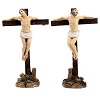
Prayer to St. Dismas
The well-known journalist and writer Nino Badano left written a special Prayer to St. Dismas. His words are a touching and heartfelt acknowledgement of the role of this mysterious man, misunderstood by history, who nevertheless was able to leave such a precious and important mark for Christians of all times.
O holy thief,
on the cross beside Jesus, you merited a gift of grace for us as well.
At no time was the Son of God, more unrecognizable and more humiliated; at no time was His kingship, declared in derision by Pilate’s scroll, more invisible and hidden; and you said to Him:
“O Jesus remember me when You are in the magnificence of Your Kingdom.”
There was Mary, John and the pious women, but of the others none;
all had forsaken Him;
the only act of faith, the only comfort of repentance, the only incredible testimony of love came to him from You.
“Truly I tell you today you will be with me in heaven.”
Disma, first of the redeemed,
we do not have the merit that You had of comforting Jesus on the cross and proclaiming Him King when His kingship was most reviled and denied; we do not have the glory of confessing Him from a gallows beside His own while everyone blasphemes and insults Him.
Even today Christ is blasphemed and insulted: even today there are crucifiers who ask Him to come down from the cross and manifest His power; but our confession after two thousand years is not as meritorious and heroic as yours.
Soon we too will be on the cross-awaiting death, and then we will remember your unpredictable and stupendous prayer.
With your words there is no man who cannot obtain salvation.
God inspired you so that we might see how divinely easy it is to obtain heaven even without having deserved it.
We need only repeat them to get the same answer as you did: for the promise of the kingdom is not commensurate with our nonexistent merits, but with His infinite ones.
O good thief, the first of the saints who entered Paradise with the Lord, help us to die like you.


